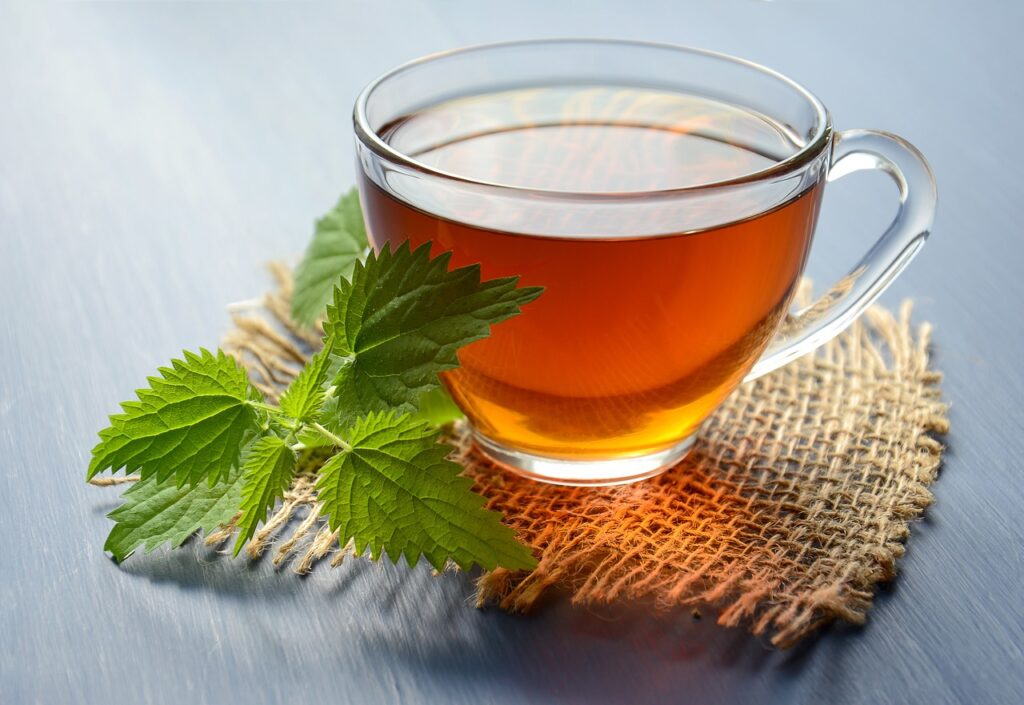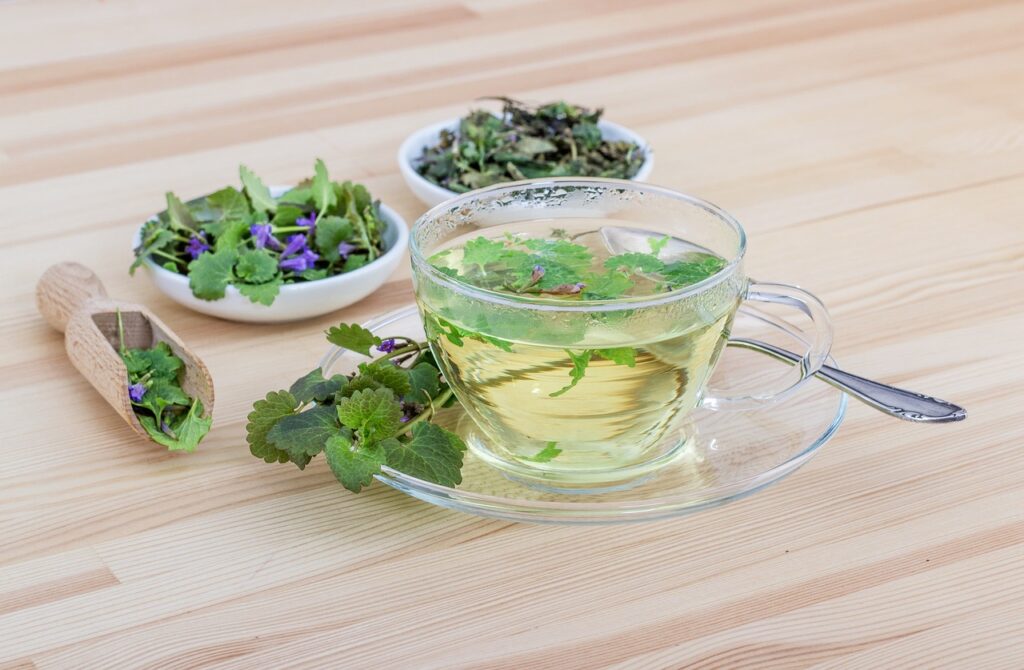Herbs for Anxiety while Breastfeeding~ Anxiety disorders can be particularly challenging for new moms, who are navigating the physical, emotional, and lifestyle changes that come with motherhood. Postpartum anxiety is a common occurrence, and it can manifest in various anxiety symptoms ranging from constant worry to intrusive thoughts. In addition to traditional treatments, many women seek alternative options to help manage their anxiety while breastfeeding.
Disclaimer: This article is provided for informational purposes only and should not replace professional medical advice. Please consult with a qualified healthcare practitioner or herbalist before using any herbal remedies.
Herbs have been used for centuries to promote relaxation and ease stress in a natural way. For breastfeeding mothers, the challenge is to find herbs that not only alleviate anxiety but are also safe for their little ones. Incorporating safe herbal remedies as part of a holistic approach to managing anxiety can contribute to a more peaceful and enjoyable breastfeeding experience.
It is essential for new moms to consult with healthcare providers before making any changes to their routine or taking herbal supplements. Some herbs may not be suitable for breastfeeding mothers or may interact with other medications. By using an informed and cautious approach, mothers can create a personalized plan for managing their anxiety, ensuring the safety and wellbeing of both themselves and their babies.
Understanding Anxiety While Breastfeeding
Defining Postpartum Anxiety
Postpartum anxiety is a type of anxiety disorder that may affect new moms during the postpartum period. It is characterized by excessive worry, irrational fears, and restlessness. Some symptoms of anxiety include constant worrying, feeling overly agitated, irritability, difficulty concentrating, and sleep disruption. It is not to be confused with the more commonly known postpartum depression, which is characterized by feelings of sadness, hopelessness, and a lack of interest in the day-to-day life.
While it is completely natural for new mothers to experience some degree of worry, postpartum anxiety surpasses the typical concerns and begins to interfere with the mother’s ability to manage her daily life. It can manifest as constant fears about the baby’s well-being, stressing about one’s parenting abilities, or even incessant worry about general health and household matters.
Impact on New Mothers and Their Daily Life
Anxiety disorders, including postpartum anxiety, can significantly impact the lives of new mothers and their day-to-day routine. A mother struggling with postpartum anxiety may find it difficult to take care of herself and her newborn, as she focuses mainly on her constant worries and fears. This constant state of alertness and stress can lead to physical and emotional exhaustion, making it challenging for the new mom to navigate her new life and responsibilities effectively.
Furthermore, the symptoms of anxiety may interfere with the new mother’s ability to breastfeed. The worry and restlessness associated with anxiety can hinder her ability to relax, which is crucial for successful breastfeeding. Inadequate relaxation can impede milk production and letdown, adding more stress to the situation. It is essential to acknowledge and address postpartum anxiety as it may not only impact the mother’s well-being, but also her bonding experience with her baby and her breastfeeding journey.
By gaining a better understanding of postpartum anxiety and its impact on day-to-day life, new mothers and their families can take the necessary steps to address this condition and ensure a healthier and more enjoyable journey into motherhood.
Common Anxiety Symptoms~ Herbs for Anxiety while Breastfeeding
When experiencing anxiety, the nervous system activates the body’s fight-or-flight response, which can cause a range of both mental and physical symptoms. Understanding these symptoms is essential for individuals suffering from anxiety, especially when trying to manage it while breastfeeding.
Anxiety symptoms can be divided into two main categories: emotional and physical. Emotional symptoms include constant worry, fear, irritability, and racing thoughts. These symptoms can interfere with daily functioning, making it difficult to focus or relax in normal situations.
Physical symptoms, on the other hand, can manifest as heart palpitations, shortness of breath, sweating, trembling, and chest pain. Some of these physical symptoms may even resemble panic attacks. During a panic attack, an individual may experience an intense surge of fear accompanied by several physical symptoms such as dizziness, nausea, and a sense of impending doom.
It is essential for breastfeeding mothers to recognize these anxiety symptoms early on and address them appropriately. By doing so, they can ensure their well-being and maintain a healthy breastfeeding relationship with their infant. Effective management strategies can include seeking professional help, adopting relaxation techniques, and incorporating herbal remedies cautiously. By addressing anxiety symptoms promptly, breastfeeding mothers can better support their own mental and emotional health, as well as the well-being of their baby.
Herbs for Anxiety while Breastfeeding

Overview of Herbal Medicine
Herbal medicine has been utilized for centuries to treat a wide range of ailments, including anxiety. For breastfeeding mothers, finding natural and safe remedies to manage anxiety is essential, as certain medications can adversely affect breast milk quality. Herbal medicines, including herbal teas, provide alternative options to alleviate anxiety while prioritizing both the mother and infant’s well-being.
Herbs Commonly Used for Anxiety
Several herbs have been recognized for their potential in reducing anxiety. Some commonly used herbs include:
- Lemon Balm: Lemon balm has been widely acknowledged for its calming effects, which can help in managing stress and anxiety.
- Withania somnifera (Indian Ginseng): Also known as ashwagandha, it has been proven beneficial in reducing anxiety and promoting relaxation.
- St. John’s Wort: Although primarily used for depression, St. John’s Wort can aid in managing anxiety symptoms.
- Valerian Root: Valerian root is often used to promote relaxation and assist with sleep, making it helpful for anxiety management.
- Passion Flower: Studies have shown passion flower’s effectiveness in reducing anxiety and promoting relaxation.
- Chamomile Flowers: Chamomile flowers have a gentle calming effect, making them a popular choice for reducing anxiety.
Safety and Dosage of Herbal Medicine
While herbal remedies can offer a natural alternative for anxiety management, it’s crucial to be cautious of potential adverse effects and interactions. Some herbs, like St. John’s Wort, may interact with other medications, affecting their efficacy. It’s essential to consult a healthcare professional before starting any herbal regimen to ensure safety and proper dosage.
Breastfeeding mothers should exercise additional caution, as some herbs may not be suitable for consumption during this period. For example, although Centella asiatica is used to alleviate anxiety, it’s not recommended during breastfeeding.
Herbal Teas and Their Benefits
Herbal teas provide a soothing method to consume beneficial herbs, and they can be easily incorporated into one’s daily routine. Green tea, for instance, contains L-theanine, an amino acid associated with promoting relaxation and reducing anxiety. Various herbal teas, such as chamomile, lemon balm, and passionflower, serve as gentle and safe options for managing anxiety in breastfeeding mothers.

Incorporating herbal medicines and teas, while keeping safety and dosage in mind, can provide natural and effective anxiety relief for breastfeeding mothers. Consultation with a healthcare professional ensures a safe transition to herbal remedies while preserving the quality of breast milk and the overall well-being of both mother and infant.
Anxiety and Effects on Breast Milk Supply~ Herbs for Anxiety while Breastfeeding
Anxiety during the postnatal period can affect not only the mental and emotional well-being of the mother but also interfere with her ability to breastfeed. It is crucial to address anxiety-related issues since they can potentially impact the breast milk production and supply.
Stress hormones, such as cortisol, can adversely influence milk production. When a mother feels anxious, the release of stress hormones may interfere with the hormones responsible for milk production, like prolactin and oxytocin. The resulting imbalance can lead to insufficient milk supply, affecting the overall breastfeeding experience and the infant’s growth.
One way to address anxiety and its subsequent effects on breast milk supply is to employ relaxation techniques. Mothers may benefit from listening to calming music, practicing mindfulness, or engaging in meditation or yoga. Developing an infant-led and responsive parenting style has also been linked to longer breastfeeding durations and can alleviate concerns about milk supply and the baby’s growth.
Several herbs have been traditionally used to help manage anxiety and promote milk production in nursing mothers. For example, herbal teas made with fenugreek, fennel seeds, and milk thistle have been reported to increase milk supply and encourage relaxation. However, it is essential to consult a healthcare professional before incorporating any herbs or supplements during breastfeeding to ensure their safety and efficacy.
In conclusion, addressing anxiety and its effects on the milk supply is crucial for the well-being of both the mother and infant. Utilizing relaxation techniques and maintaining an infant-led, responsive parenting style can alleviate stress and support successful breastfeeding. Herbal remedies may also offer additional support, but a healthcare professional should always be consulted first.
Alternative Medicine and Complementary Therapies
Exploring Alternative Medicine
Alternative medicines and complementary therapies are gaining popularity among mothers experiencing anxiety during breastfeeding. These methods offer a more natural approach to managing anxiety, while avoiding the potential risks associated with conventional medications. Examples of alternative medicine techniques include acupuncture, which has been found to help reduce the stress and anxiety associated with pain, and herbal remedies, such as Yang foods or herbs, which may contribute to an overall sense of balance and well-being.
The Role of a Healthy Lifestyle
In addition to alternative medicines and complementary therapies, a healthy lifestyle can play a vital role in managing anxiety during breastfeeding. Incorporating regular physical activity into one’s daily routine can help reduce anxiety through the release of endorphins and promoting a general sense of well-being. Meditation and mindfulness exercises are also effective in alleviating stress and anxiety by fostering a sense of inner peace and control over one’s thoughts and emotions.
Exploring Dietary Supplements

Dietary supplements, such as fatty acids and prenatal vitamins, can provide essential nutrients to support overall health and contribute to reducing anxiety during breastfeeding. Omega-3 fatty acids, for example, have been shown to have beneficial effects on mood and may help alleviate anxiety. Incorporating a prenatal vitamin into one’s diet can ensure that the body receives necessary nutrients, promoting both physical and mental well-being. However, it is crucial to consult a healthcare provider before introducing any dietary supplements, particularly during the breastfeeding stage, as some may not be suitable for both mother and baby.
In conclusion, alternative medicines, complementary therapies, and healthy lifestyle changes offer a variety of ways to address anxiety during breastfeeding. When considering these options, it is essential to consult with a healthcare provider to determine the most suitable and safe approach for each individual.
Clinical Aspects of Anxiety
Anxiety Disorders and Diagnosis
Anxiety is a normal physiological response to stress, but when it becomes overwhelming or chronic, it may be classified as an anxiety disorder. Healthcare professionals diagnose these conditions using criteria outlined by the National Institute of Mental Health. Some common types of anxiety disorders include generalized anxiety disorder, panic disorder, and social anxiety disorder. It is crucial for individuals experiencing symptoms to consult a healthcare provider for proper diagnosis and recommendations for treatment options.
Treatment Options Available
To manage anxiety disorders, healthcare professionals often prescribe a combination of medications and therapy approaches. The choice of treatment depends on the severity of the symptoms, a patient’s medical condition, and their response to previous treatments. Some common treatment options include:
- Prescription medications such as selective serotonin reuptake inhibitors (SSRIs) and tricyclic antidepressants
- Cognitive Behavioral Therapy (CBT)
- Support groups
- Psychotherapy
- Other alternative approaches (e.g. herbal remedies, meditation, etc.)
An Overview of SSRIs and Tricyclic Antidepressants
Selective serotonin reuptake inhibitors (SSRIs) and tricyclic antidepressants are two classes of prescription medications often used for the treatment of anxiety disorders. SSRIs, such as fluoxetine and sertraline, work by increasing the availability of serotonin in the brain, which helps regulate mood. Tricyclic antidepressants, such as amitriptyline and nortriptyline, work by inhibiting the reuptake of both serotonin and norepinephrine. Both types of medications have been proven effective in relieving anxiety symptoms, but they may also cause side effects, which should be closely monitored and reported to the healthcare provider.
Cognitive Therapy Approaches
Cognitive Behavioral Therapy (CBT) is a widely used psychotherapeutic intervention for anxiety disorders. This approach focuses on helping individuals identify and modify irrational thoughts and behaviors that contribute to their anxiety. Through CBT, patients learn skills to cope with their symptoms and improve their overall quality of life. Other therapy approaches that might be combined with CBT include acceptance and commitment therapy, dialectical behavior therapy, and exposure therapy. Healthcare professionals often adapt these therapy approaches to ensure they are effective and appropriate for each individual’s unique situation and needs.
Potential Risks and Side Effects
Discussion on Possible Side Effects
Using herbs for anxiety relief during breastfeeding can have potential side effects and adverse effects for both the mother and the infant. Certain herbs, such as kava kava, are known for their calming effects but may contribute to central nervous system depression when consumed in excessive amounts. This could lead to drowsiness or other undesirable effects in the nursing infant ^1^.
Allergic reactions are also a concern when using herbal remedies, as individuals may have sensitivities to certain plants or their components. These reactions could manifest in various forms, ranging from mild skin irritation to more severe responses, such as respiratory distress or anaphylaxis. It is essential to be cautious and consult a healthcare professional when introducing new herbs, especially while breastfeeding.
Considerations for Large Doses
It is important to consider the potential risks of consuming large amounts of herbs during breastfeeding. The recommended dose for each herbal remedy can vary, and exceeding the advised amount may lead to increased chances of side effects. Some herbal supplements, when taken in high doses, can cause adverse effects not only for the mother but also the newborn. For example, melatonin is a natural hormone often used for sleep and anxiety disorders, yet its safety during breastfeeding remains uncertain since it may cause sleepiness in nursing infants ^2^.
Key points to consider when using herbs during breastfeeding:

- Always follow the recommended dose and consult a healthcare professional before using any new herbal supplement.
- Monitor for potential side effects or adverse reactions in both the mother and the infant.
- Take precautions to avoid allergic reactions by starting with a small dose and gradually increasing it under professional guidance.
In conclusion, while herbs may provide some relief from anxiety during breastfeeding, it is crucial to stay informed about the potential risks and side effects. Being aware of these considerations is essential for ensuring the safety and well-being of both the mother and the infant.
Involvement of Family Members
Family members play a crucial role in supporting a breastfeeding mother who is dealing with anxiety. Communication and understanding are essential to foster a positive environment for the nursing mother. Sharing concerns and experiences with close relatives can contribute to a feeling of togetherness and provide emotional support.
Encouraging family members to learn about herbs that can aid in reducing anxiety while breastfeeding is beneficial for everyone involved. Knowledgeable family members may help in identifying suitable herbs, confirming their safety for breastfeeding mothers, and discussing potential uses. This shared understanding strengthens the support offered to the mother.
Support groups offer a valuable resource for breastfeeding mothers experiencing anxiety. By joining a support group, either in-person or online, mothers can connect with others facing similar challenges and share information about anxiety-relieving herbs. Family members may also choose to attend these support groups or participate online to gain insights into the mother’s experiences and learn more about helpful herbs.
Creating a schedule is another practical measure that family members can employ to support a breastfeeding mother with anxiety. By helping with daily tasks, such as housekeeping and childcare, family members can create a sense of order and alleviate additional stressors that may contribute to anxiety. When family members are actively involved in the mother’s life, she may feel greater confidence and reassurance.
In conclusion, the involvement of family members in the process of managing anxiety while breastfeeding can lead to better outcomes for both the mother and baby. By offering a supportive environment, sharing knowledge about beneficial herbs, engaging in support groups, and assisting with daily tasks, family members can help alleviate anxiety and promote a positive breastfeeding experience.







One comment on “Herbs for Anxiety while Breastfeeding: A Safe and Effective Guide”